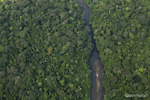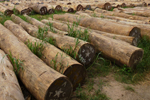Jeremy Hance
mongabay.com
February 21, 2013

Recent forest clearance for oil palm by Olam, Kango, Gabon. Photo by: Alexander De Marcq.
A new report by The Rainforest Foundation UK (RFUK), dramatically entitled The Seeds of Destruction, announces that new palm oil plantations in the Congo rainforest will soon increase fivefold to half a million hectares, an area nearly the size of Delaware. But conservationists warn that by ignoring the lessons of palm oil in Southeast Asia, this trend could be disastrous for the region's forests, wildlife, and people.
"Governments of Congo Basin countries have handed out vast tracts of rainforest for the development of palm oil with apparently little or no attention to the likely impacts on the environment or on people dependent on the forest," Simon Counsell, Executive Director of the Rainforest Foundation UK, said.
The palm tree used to produce palm oil originated in Africa, so production in the Congo Basin isn't new. But industrial palm oil production involving massive plantations is a recent development for the region. The approach, modeled after operations in Southeast Asia, raises concerns among environmentalists who argue that palm oil has been a disaster for the forests of Malaysia and Indonesia. Indeed, scientific research has found that between 1990 and 2000, 86 percent of all deforestation in Malaysia was for palm oil.
The largest palm oil developer in the Congo Basin is currently Malaysian-owned Atama Plantations SARL, which is working to establish a 180,000-hectare (450,000-acre) plantation in the Republic of Congo. But the entire enterprise is masked by a complete lack of transparency, says the report."No publicly available maps of the concession are available, but evidence suggests that the forests designated for clearance mostly appear to be virgin rainforest that is habitat for numerous endangered species, including chimpanzees and gorillas. The area borders, and some of it may fall inside, a planned National Park and Ramsar site," according to the RFUK report, which notes that logging has already begun on the concession.
The RFUK report further questions whether the plantation development is simply an excuse to log what it calls "primary forests with significant timber stocks."
Another controversial concession, this time in Cameroon, has received considerable pushback from international NGOs as well as local groups. U.S.-based Herakles Farms is working to develop a 60,000 hectare palm oil plantation in forest bordering four protected areas, but the company's reputation has been tarnished by local protests, as well as condemnation from international groups such as Greenpeace. Last year, 11 top tropical biologists sent an open letter to Herakles condemning the project.
But Herakles and other companies say they are bringing economic development to a notoriously poor part of the world.
The RFUK report notes that in many cases governments appear unwilling even to take advantage of the economic benefits of palm oil plantations, by overly-sweetening deals to foreign corporations.
"The contracts signed between governments and oil palm developers are being kept secret, reducing transparency and democratic accountability. Those contracts that have come to light show that governments have already signed away some of the potential economic benefits, by granting developers extremely generous tax breaks of 10 to 16 years and land for 'free' or at highly discounted rates," the report reads.
In addition, the palm oil plantations are speaking local conflict with traditional landowners, much as they have done in Malaysia and Indonesia. Locals often have little input on the project and in some cases leases are extraordinarily long, for example Herakles Farms' lease is 99 years.
"New large-scale oil palm developments are a major threat for communities, livelihoods and biodiversity in the Congo Basin," Samuel Nguiffo, Director of the Center for Environment and Development (CED), Cameroon, said. "It is absolutely not the appropriate answer to the food security and job creation challenges the countries are facing. Supporting small-scale family agriculture is a better solution."
After years of fierce criticism in Southeast Asia over environmental and social issues, the industry and NGOs created the Roundtable on Sustainable Palm Oil (RSPO) in 2004 to address problems connected to oil production.
The RFUK report notes that Congo basin countries must learn from the lessons of little-regulated palm oil expansion in Southeast Asia.
"There is a need for regional agreement to ensure that best practices are mandatory for any new oil palm development, including avoiding high conservation value forests and ensuring the rights of existing forest dwellers are respected," adds Counsell, whose report warns that RSPO alone won't be enough to produce sustainable palm oil in Africa.
In addition, the report recommends greater transparency across the board; targeting degraded instead of forested lands; ensuring locals have free, prior and informed consent (FPIC); and more focus on small, local palm oil over massive foreign plantations.

Atama Plantations SARL site in the Republic of the Congo. Click to enlarge.
Related articles
Controversial palm oil project concession in Cameroon is 89 percent 'dense natural forest'
 (02/21/2013) Satellite mapping and aerial surveys have revealed that a controversial palm oil concession in Cameroon is almost entirely covered by "dense natural forest," according to a new report by Greenpeace. The activist group alleges that the concession, owned by Herakles Farms, is under 89 percent forest cover. The U.S.-based corporation intends to build a 70,000 hectare palm oil plantation in a region surrounded by four protected areas, including Korup National Park, but has faced stiff criticism from numerous environmental groups as well as conflict with locals.
(02/21/2013) Satellite mapping and aerial surveys have revealed that a controversial palm oil concession in Cameroon is almost entirely covered by "dense natural forest," according to a new report by Greenpeace. The activist group alleges that the concession, owned by Herakles Farms, is under 89 percent forest cover. The U.S.-based corporation intends to build a 70,000 hectare palm oil plantation in a region surrounded by four protected areas, including Korup National Park, but has faced stiff criticism from numerous environmental groups as well as conflict with locals.
Over 11,000 elephants killed by poachers in a single park [warning: graphic photo]

Gorilla paradise: new park safeguards 15,000 western lowland gorillas
(01/31/2013) In 2008 the Wildlife Conservation Society (WCS) announced a jaw-dropping discovery: remote swamp forests in northern Republic of Congo contained a stunning population of 125,000 western lowland gorillas that had somehow gone unnoticed by scientists. At the time the President of WCS, Steven E. Sanderson, called the area the "mother lode of gorillas," and expressed hope that the discovery would lead to a new park. Well, late last year, a park was finalized.
Mountain gorilla population up by over 20 percent in five years
(11/13/2012) A mountain gorilla census in Uganda's Bwindi Impenetrable National Park has a population that continues to rise, hitting 400 animals. The new census in Bwindi means the total population of mountain gorillas (Gorilla beringei beringei) has reached 880?up from 720 in 2007?and marking a growth of about 4 percent per year.
Foreign loggers and corrupt officials flouting logging moratorium in the Democratic Republic of Congo
 (11/08/2012) In 2002 the Democratic Republic of Congo (DRC) announced a moratorium on commercial logging in a bid to save rapidly falling forests, however a new report by Global Witness alleges that industrial loggers are finding a way around the logging freeze. Through unscrupulous officials, foreign companies are abusing artisanal permits?meant for local community logging?to clear-cut wide swathes of tropical forest in the country. These logging companies are often targeting an endangered tree?wenge (Millettia laurentii)?largely for buyers in China and Europe.
(11/08/2012) In 2002 the Democratic Republic of Congo (DRC) announced a moratorium on commercial logging in a bid to save rapidly falling forests, however a new report by Global Witness alleges that industrial loggers are finding a way around the logging freeze. Through unscrupulous officials, foreign companies are abusing artisanal permits?meant for local community logging?to clear-cut wide swathes of tropical forest in the country. These logging companies are often targeting an endangered tree?wenge (Millettia laurentii)?largely for buyers in China and Europe.
NASA satellites catch vast deforestation inside Virunga National Park
(10/03/2012) Two satellite images by NASA, one from February 13, 1999 and the other from September 1, 2008 (see below), show that Virunga National Park is under assault from deforestation. Located in the eastern edge of the Democratic Republic of Congo (DRC) the park has been assailed by entrenched conflict between rebels and government forces, as well as slash-and-burn farming, the charcoal trade, and a booming human population.
|
CITATION: Jeremy Hance mongabay.com (February 21, 2013). Activists warn of industrial palm oil expansion in Congo rainforest.http://news.mongabay.com/2013/0221-hance-congo-palm-oil.html |
Tags:
palm oil plantations africa congo congo rainforest monocultures social conflict land conflict land grabbing deforestation forests tropical forests rainforest rainforest agriculture rainforest destruction rainforests rainforest logging green environment jeremy hance threats to rainforests threats to the rainforest
Environmental news index | RSS | News Feed | Twitter | Home
Advertisements:

T-shirts, shopping bags, calendars, and more.
WEEKLY NEWSLETTER
RECENT FEATURES
DONATE
If you are interested in supporting our independent reporting on forest issues, our education initiatives, or other activities, please visit mongabay.org for more information.
PHOTOS
| ABOUT Mongabay.com seeks to raise interest in and appreciation of wild lands and wildlife, while examining the impact of emerging trends in climate, technology, economics, and finance on conservation and development (more) Help support mongabay.com when you buy from Amazon.com |
Source: http://news.mongabay.com/2013/0221-hance-congo-palm-oil.html
golden state warriors free agents nfl 2012 milwaukee bucks bear grylls us news law school rankings gael glen rice jr
No comments:
Post a Comment